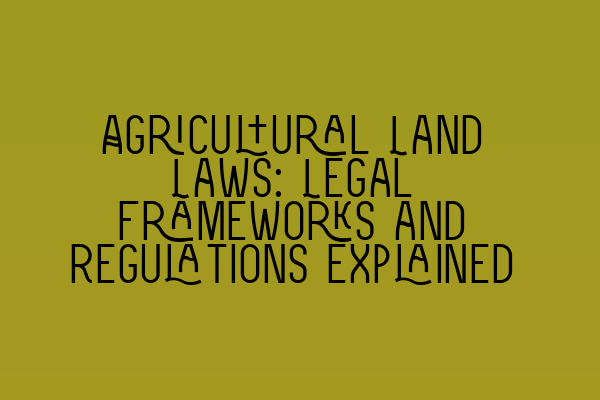Agricultural Land Laws: Legal Frameworks and Regulations Explained
Agricultural land plays a crucial role in the economy, environment, and society as a whole. It is essential for the production of crops, livestock, and other agricultural activities. To ensure the proper management and use of agricultural land, there are various legal frameworks and regulations in place. In this blog post, we will explore the key aspects of agricultural land laws, providing a comprehensive understanding of the legal landscape.
The Definition of Agricultural Land
Before delving into the legal aspects, let’s start with the definition of agricultural land. Agricultural land refers to any land that is used for farming, ranching, livestock grazing, or any other agricultural purposes. It includes both arable land for cultivation of crops and pastureland for animal husbandry. Agricultural land can vary in size and location, from small family farms to vast commercial operations.
Regulatory Bodies and Legislation
In the United Kingdom, agricultural land laws are governed by various regulatory bodies and legislation. The key regulatory body is the Department for Environment, Food and Rural Affairs (DEFRA), responsible for setting policies and regulations related to agriculture and rural affairs. DEFRA ensures the implementation of legislation such as the Agriculture Act 2020, which governs agricultural subsidies, land use, and environmental protection.
Additionally, the Rural Payments Agency (RPA) is responsible for administering agricultural subsidies and grants. The RPA oversees schemes such as the Basic Payment Scheme (BPS) and Countryside Stewardship, which provide financial support and incentives for farmers and landowners.
Planning Permission and Development
When it comes to agricultural land, planning permission and development rights are important considerations. In general, agricultural land benefits from certain permitted development rights that allow farmers to carry out certain activities without obtaining planning permission. These include agricultural buildings, farm tracks, and machinery storage.
However, it’s essential to note that there are limitations and restrictions regarding the scope and scale of development on agricultural land. Local planning authorities have the power to grant or refuse planning permission for specific projects. It’s important for farmers and landowners to seek professional advice and ensure compliance with planning regulations to avoid potential legal issues.
Agricultural Tenancies
Agricultural tenancies are another crucial aspect of agricultural land laws. These tenancies govern the rights and responsibilities of tenants and landlords in relation to agricultural land. The main piece of legislation regulating agricultural tenancies in England and Wales is the Agricultural Holdings Act 1986.
Under this Act, tenants have certain security of tenure, meaning they have the right to continue their agricultural business on the land unless certain conditions for termination are met. The Act also provides guidelines for rent determination, compensation for improvements, and dispute resolution between tenants and landlords.
Rights of Way and Land Access
Access to agricultural land is a critical consideration for farmers and landowners. It is necessary for transportation of machinery, livestock, and access to water sources. Rights of way provide legal access rights to individuals and vehicles over certain land.
Establishing and maintaining rights of way can involve various legal processes, including agreements with neighboring landowners and public authorities. Furthermore, it’s important to be aware of public rights of way, which may allow the public to access certain areas of agricultural land. Understanding these rights and obligations is essential for ensuring smooth operations and preventing potential disputes.
Environmental Regulations and Conservation
Environmental regulations and conservation efforts play a significant role in agricultural land laws. Farmers and landowners have a responsibility to protect the environment and maintain sustainable practices. The Common Agricultural Policy (CAP) has been a key policy framework in the European Union for supporting sustainable agriculture and environmental conservation.
Following the UK’s departure from the EU, the government introduced the Environmental Land Management (ELM) scheme, which aims to replace the CAP subsidies with a focus on environmental protection and public goods. The ELM scheme will provide incentives for farmers and landowners to adopt environmentally friendly practices and contribute to conservation efforts.
Conclusion
Agricultural land laws provide the legal framework for the management and use of agricultural land. Understanding these laws is crucial for farmers, landowners, and anyone involved in agricultural activities. From planning permission to agricultural tenancies and environmental regulations, compliance with the legal requirements ensures the sustainable and responsible use of agricultural land.
If you’re interested in learning more about property law or preparing for the SQE exams, you can check out our related articles:
